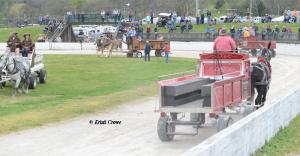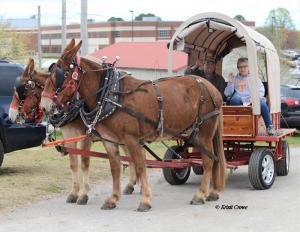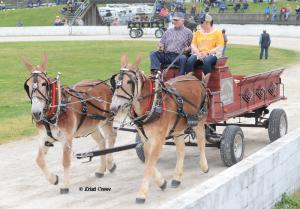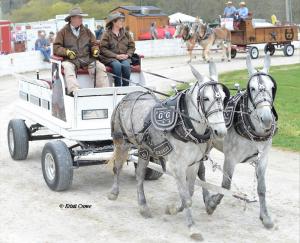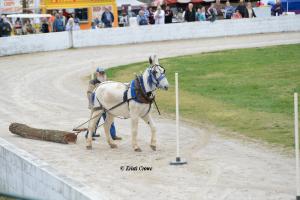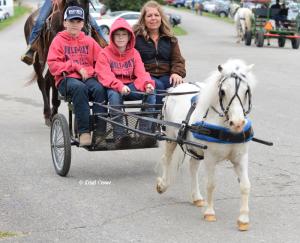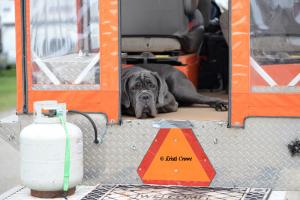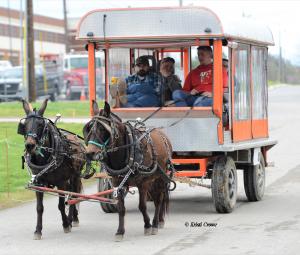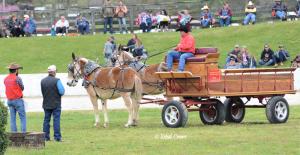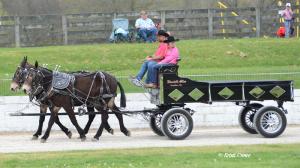Article & photos by Kristi Crowe
The first week in April each year, the wagon train featuring mules arrives at its destination in Columbia, Tennessee, the self-proclaimed Mule Capital of the World. The reason so many mules come to town: Mule Day, but contrary to the name, Mule Day has festivities for the entire week: April 1-7, 2019.
One can find mules of every size in attendance, from mini mules to mammoth mules. There are also horses of all breeds and donkeys of various sizes. The shows involve traditional mule activities, such as a team pulling a wagon, a single mule pulling a log through an obstacle course, and mule pulling.
Mule Day has something for everyone. There is a section for kids to go on carnival rides and a bounce house. There are all kinds of food vendors and plenty of vendors with just about anything with a mule on it. There is also tack for riding or harness for sale.
Mule Day started in the 1840s, then called Breeders’ Day. Maury County, Tennessee had such an abundance of mule breeders and buyers that at one time they had one of the world’s largest livestock markets. The first Mule Day Parade was organized by Thomas Marion Brown and was held in 1934. From a simple meeting of breeders to an event hosting more than 200,000 people, Mule Day has evolved from a one-day to a week-long event, and after nearly 180 years, it is still going strong.
When asked why some people prefer mules over horses, Dwayne Hawk said, because mules are “smarter and stouter” than horses. They watch where their feet are going and are very cautious about the terrain. A horse will not be as cautious, which could lead to a dangerous situation in the mountains. Mules are also more laid back and not as likely to react highly to stimuli like a horse will. According to Dwayne, mules are definitely stubborn. If you try to get them to do something they perceive as dangerous, they will not do it. According to Dwayne’s wife, Marilyn, mules “know they have a job to do when the harness is put on.” Dwayne and Marilyn, with their mules Molly and Dolly, join the Tellico Plains Wagon Train each year and cross the Smoky Mountains on an organized wagon train, carrying all of their supplies in their wagon. Dwayne also uses their mules to go packing in the mountains.
The Mule Day competitions involve both under saddle (riding) and in harness classes. In the under saddle classes, the mules are judged on their performance and ability to be ridden. The in harness classes involve wagons, log pulling, and weight pulling.
The wagon pulling competition is judged on the mules’ ability to pull a wagon in the arena at a walk, trot, and canter. They also have to change direction at a trot. They do a simple pattern, stop, back up, and then move the team of mules laterally side to side without the wagon moving as it pivots on the front axle.
The log pulling show demonstrates how well a mule can listen to the driver and manipulate the log through a serpentine of poles. During this event, the driver only has one line (the driving rein) attached to the mule. The purpose is to be able to control the mule during logging with only one line, as that is all that would have been used at the time logs were exclusively pulled by mules. A team of mules would be driving to the forest for logging, and then each mule would pull logs to the gathering place individually. The logs would then be loaded up for transport out of the forest by both mules.
The pulling completion is for single mules or a team of mules to see at what distance they can pull a particular weight. Even mini donkeys and mules have their own competitions.
If you like anything mule, come to Columbia, Tennessee the first week in April. Check out muleday.org for more information and the full program for this year’s event.
The first week in April each year, the wagon train featuring mules arrives at its destination in Columbia, Tennessee, the self-proclaimed Mule Capital of the World. The reason so many mules come to town: Mule Day, but contrary to the name, Mule Day has festivities for the entire week: April 1-7, 2019.
One can find mules of every size in attendance, from mini mules to mammoth mules. There are also horses of all breeds and donkeys of various sizes. The shows involve traditional mule activities, such as a team pulling a wagon, a single mule pulling a log through an obstacle course, and mule pulling.
Mule Day has something for everyone. There is a section for kids to go on carnival rides and a bounce house. There are all kinds of food vendors and plenty of vendors with just about anything with a mule on it. There is also tack for riding or harness for sale.
Mule Day started in the 1840s, then called Breeders’ Day. Maury County, Tennessee had such an abundance of mule breeders and buyers that at one time they had one of the world’s largest livestock markets. The first Mule Day Parade was organized by Thomas Marion Brown and was held in 1934. From a simple meeting of breeders to an event hosting more than 200,000 people, Mule Day has evolved from a one-day to a week-long event, and after nearly 180 years, it is still going strong.
When asked why some people prefer mules over horses, Dwayne Hawk said, because mules are “smarter and stouter” than horses. They watch where their feet are going and are very cautious about the terrain. A horse will not be as cautious, which could lead to a dangerous situation in the mountains. Mules are also more laid back and not as likely to react highly to stimuli like a horse will. According to Dwayne, mules are definitely stubborn. If you try to get them to do something they perceive as dangerous, they will not do it. According to Dwayne’s wife, Marilyn, mules “know they have a job to do when the harness is put on.” Dwayne and Marilyn, with their mules Molly and Dolly, join the Tellico Plains Wagon Train each year and cross the Smoky Mountains on an organized wagon train, carrying all of their supplies in their wagon. Dwayne also uses their mules to go packing in the mountains.
The Mule Day competitions involve both under saddle (riding) and in harness classes. In the under saddle classes, the mules are judged on their performance and ability to be ridden. The in harness classes involve wagons, log pulling, and weight pulling.
The wagon pulling competition is judged on the mules’ ability to pull a wagon in the arena at a walk, trot, and canter. They also have to change direction at a trot. They do a simple pattern, stop, back up, and then move the team of mules laterally side to side without the wagon moving as it pivots on the front axle.
The log pulling show demonstrates how well a mule can listen to the driver and manipulate the log through a serpentine of poles. During this event, the driver only has one line (the driving rein) attached to the mule. The purpose is to be able to control the mule during logging with only one line, as that is all that would have been used at the time logs were exclusively pulled by mules. A team of mules would be driving to the forest for logging, and then each mule would pull logs to the gathering place individually. The logs would then be loaded up for transport out of the forest by both mules.
The pulling completion is for single mules or a team of mules to see at what distance they can pull a particular weight. Even mini donkeys and mules have their own competitions.
If you like anything mule, come to Columbia, Tennessee the first week in April. Check out muleday.org for more information and the full program for this year’s event.
